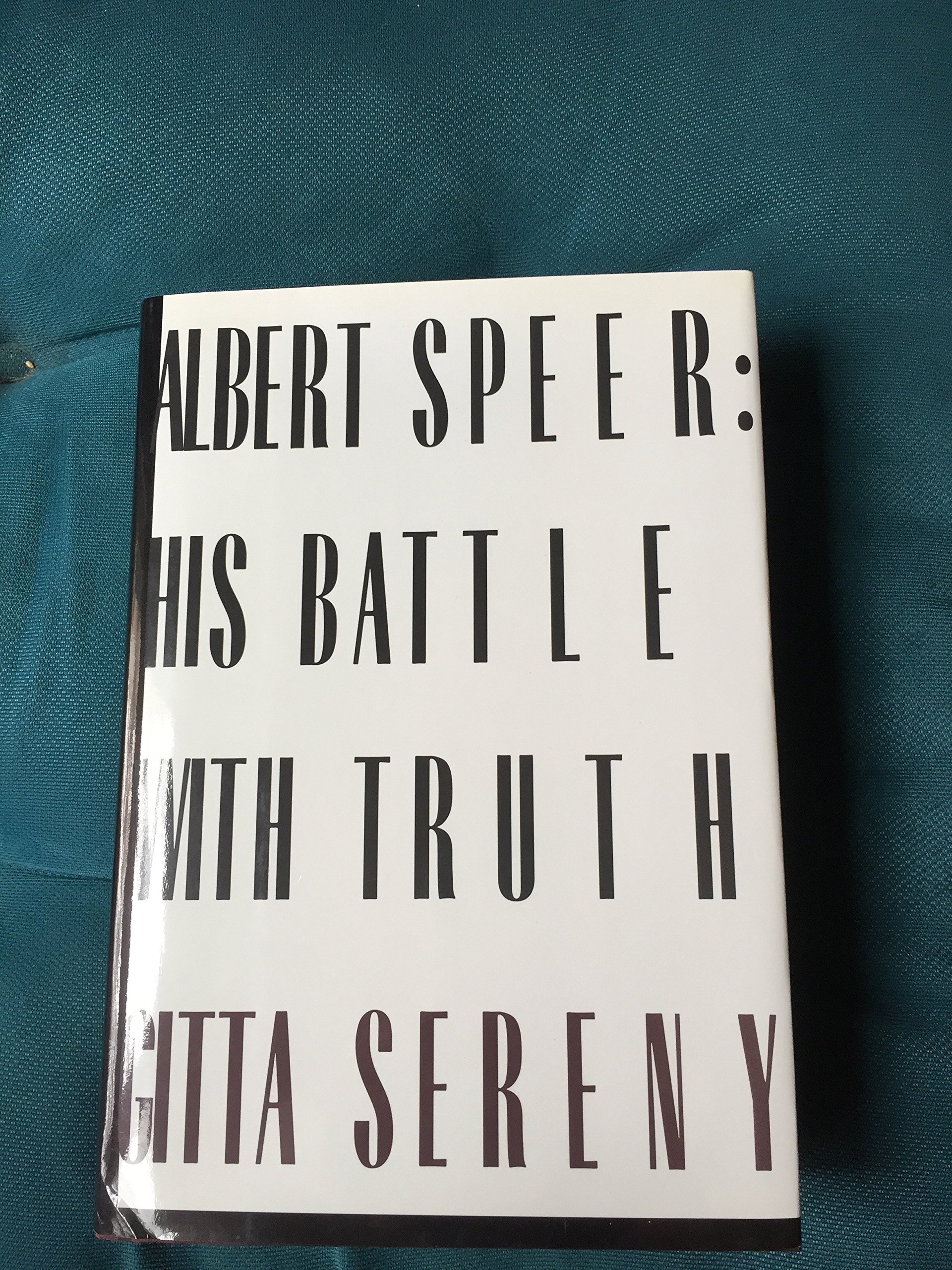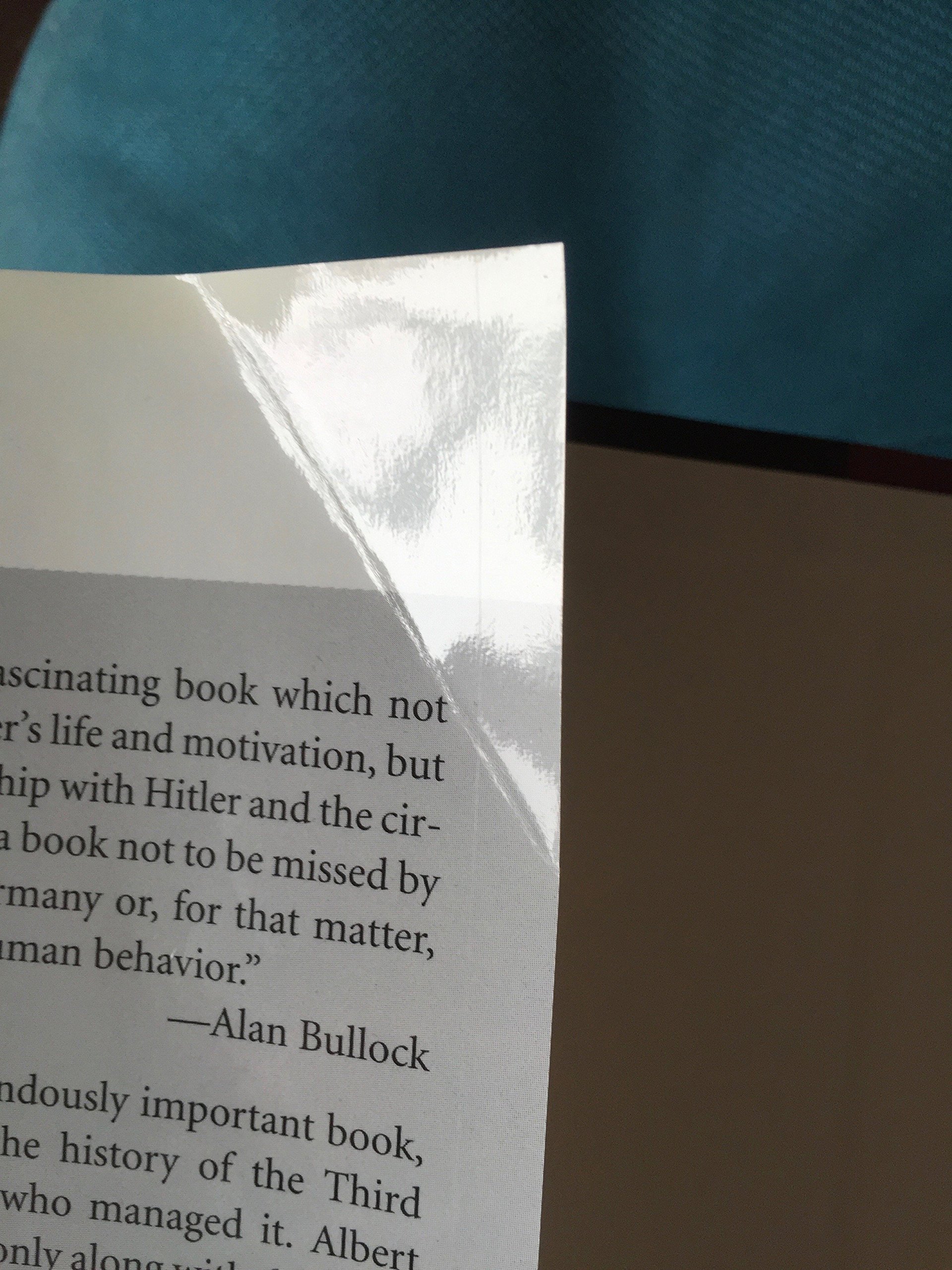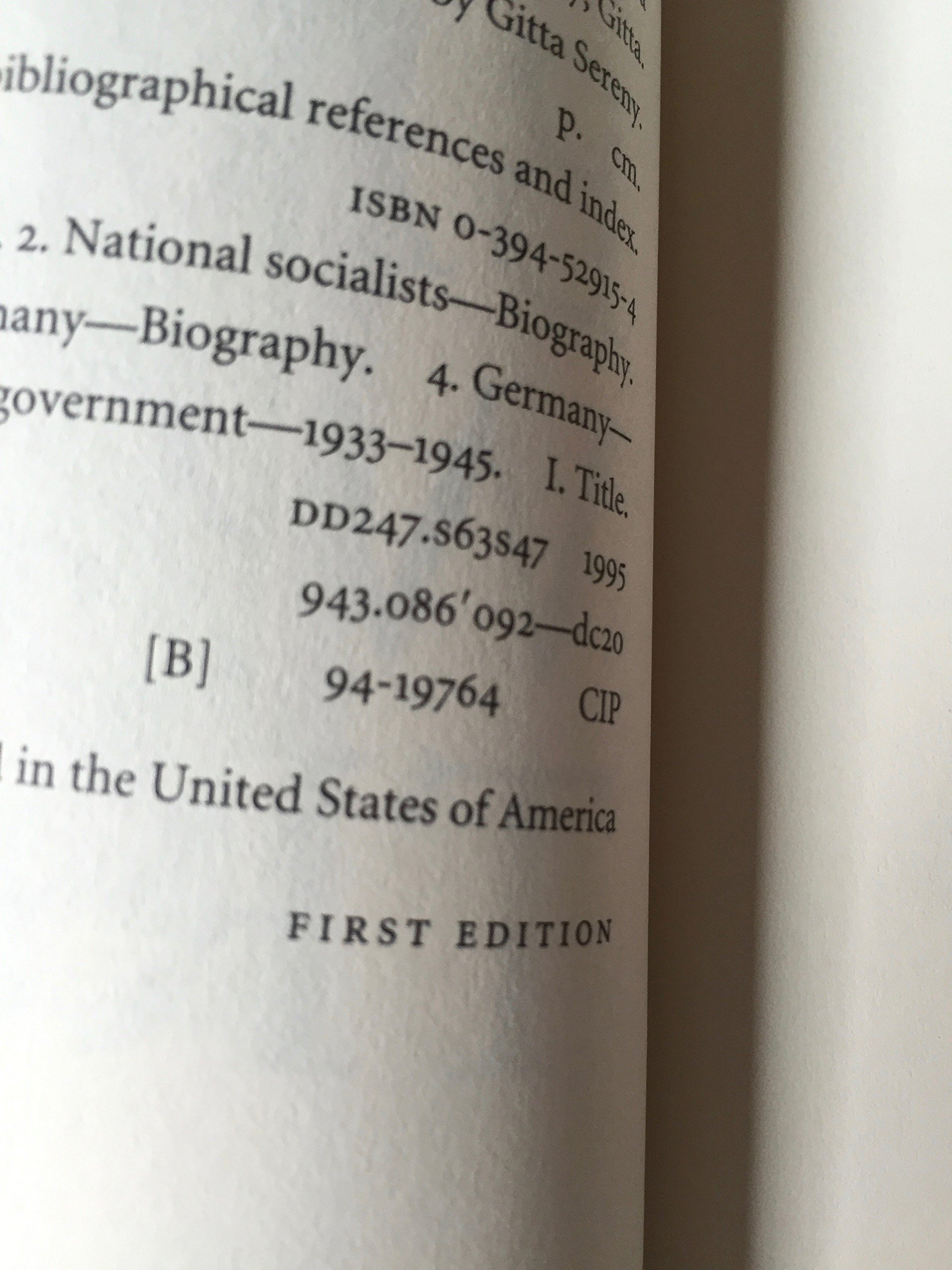Customer Services





Albert Speer: His Battle With Truth
K**T
ALBERT SPEER - Im Kampf mit der Wahrheit und das deutsche Trauma
Late in 1989, when I was living and working on contract overseas, I read Albert Speer's book Inside the Third Reich, in which he described, in extensive detail, the blossoming of his career, first as Hitler's principal architect throughout the 1930s and the early war years, and later as der Führer's Minister of Armaments and War Production from 1942 to 1945. He and Hitler (who fancied himself an architect given his lifelong passion for art and architecture) had a uniquely special relationship. I was utterly enthralled with that book because it provided me with a tangible sense of how Germany functioned under Hitler and his chief lieutenants (e.g., Goering, Hess, Bormann, Himmler, and Goebbels) ---- most of whom Speer knew very well.What is more: unlike many of his contemporaries in the Nazi Party, Speer, upon being brought to trial for war crimes at Nuremberg, was the only one who freely confessed his responsibility as Minister who used slave labour to help sustain the German war machine, and thus prolong the war. He impressed me deeply because, upon being fully apprised of the enormity of Hitler's crimes in the weeks and months following V-E Day, Speer --- normally not a person given to introspection and displays of emotion --- accepted Germany's guilt and sought to atone for that. Thus, he served a 20-year prison sentence and spent the rest of his life trying to face up to his onetime devotion and faithful service to Hitler and his regime.This particular book gave me a rigorous, more objective look at Albert Speer (during various stages of his life), both from the vantage point of those who worked with him before and during the war, as well as his critics and detractors in subsequent years.For all his organizational brilliance and intelligence, Speer could, at times, be arrogant, abrupt, and emotionally detached. The latter trait he recognized in himself and sought to address, with a view to self-improvement. For it was during Speer's time in Spandau prison that he made the acquaintance of a young French chaplain, with whom he became especially close (the chaplain served at Spandau for about 3 years) and gave him the impetus to strive to become a different, better person.I'd like to cite some of Speer's own words, which I hope will convey to the person reading this review, his struggle for truth:"I have often asked myself what I would have done if I had come to feel a share in the responsibility for the things Hitler did in areas other than those in which I was directly involved. And unfortunately, if I'm honest, my reply has to be negative --- the tasks Hitler had confided to me, first in architecture, then in government, his 'friendship,' the passionate conviction he radiated, the power his favor conferred on me, all this was quite simply overwhelming and had become so indispensable to me that to hang on to it I would probably have swallowed anything."True ... much later I did oppose [Hitler] in many ways. But... that cannot serve as justification of my previous passivity.... The truth is that I only woke up to what he was doing --- what he was --- when I had to acknowledge to myself that he intended to pull the German people down into perdition with him. And really, all I did then was only in an effort to prevent that."For anyone who wants to examine the life and times of a person who turned away from having once served so faithfully one of the world's most brutal dictatorships and spent the remainder of his life in atonement [Speer gave the bulk of proceeds from his best-selling books anonymously to various Jewish charities worldwide.] and self-examination, READ THIS BOOK. I think, by so doing, you'll come to share (as I do) the author's assessment of Albert Speer:"I came to understand and value Speer's battle with himself and saw in it the re-emergence of the intrinsic morality he manifested as a boy and youth. It seemed to me it was some kind of victory that this man --- just this man --- weighed down by intolerable and unmanageable guilt, with the help of a Protestant chaplain, a Catholic monk and a Jewish rabbi, tried to become a different man."
D**N
Irreproachable and Profound
Sereny's style is irreproachable and this book offers profound insights. Its uncomfortable to read, especially for those of us who grew up knowing Speer's involvement with the Nazi regime to see him and other members of that regime portrayed as human beings, and rather ordinary human beings at that. The extent of self-delusion amongst this group is frightening but real. Considering the crimes of the Nazi's one tends to turn away in disgust, wishing that it would suffice to hang a few leading figures. What one retains from Sereny's books is the awareness that we must struggle to eliminate the cultural and systemic conditions that facilitate Genocide and war, but that punishing individuals for such enormous crimes really does not solve anything.I have been reading Sereny's books for better insight into the 'others perspective.' The Nazi top were really no different than contemporary politicians who promote all kinds of injustices at a distance through a burocracy that relieves them of moral responsibility and awareness of the consequences to others. The over 100.000 civilians who have died in Iraq since the beginning of the war on terror are just as much collateral damage as the millions of Russians and Poles murdered by the Nazis. The methods and intentions may be different, but what do the victims care?Like Sereny, I believe we cannot really learn everything we need to learn to prevent war and injustice if we ignore the voices and experiences of perpetrators and accomplices and this is what her work does best.
F**E
Interesting look at the enigmatic Albert Speer.
If you are interested in the history of WW2 and the inside workings of the Nazi war machine, then Albert Speer is one of the people that can give you a look behind the curtain. This book is filled with revealing interviews of Speer, and some of his closest associates. No punches are pulled in this endeavor. A great read for anyone interested in trying to understand Speer, and his unusual persona.
G**G
Very well written with revealing information that helps us to ...
Very well written with revealing information that helps us to understand some of the behavior of that time period. The author neither justifies or condones her findings but leaves it to the reader to consider if their thinking of history may have a new slant.
B**T
Immensely Important Work
This is a work of astonishing breadth and detail. The author knew Speer for four years before his death and spent time with him and his wife at their home. Having spent a career of studying and writing about the Nazis, Gitta Sereny has interviewed a great many people intimately involved with or victimized by the Third Reich.She also talked at length and even developed friendships with several very important Speer intimates, such as his secretaries and his literary executor. Given that Sereny obviously came to like Speer and perhaps even admire him, it's not surprising that at times, she seems at pains to accept his ultimate guilt. Speer was a charming, erudite, and extremely intelligent man who was also engaged in an intense battle for the truth that he eventually probably lost. But the immense wealth of important information she brings to the discussion of Speer and the Third Reich is unquestioned.Speer was a fascinating man and the book is very aptly subtitled. Unless someone comes out and says, "I spoke with Speer about the destruction of the Jews during the war," we will likely never answer for certain whether he knew, and whether his breakdown after Posen and Dora was due to his shattering break with Hitler over this knowledge.But what is clear is that Speer was quite honestly tortured about his participation in Hitler's madness and spent the rest of his life being unable to let it go.I could not put this book down and at 720 pages, it keeps you riveted throughout.
M**R
Still worth reading 25 years after publication
Albert Speer was an exceptional figure among the Nazi-Elite. He was the only one who admitted guilt during the Nurenberg trials, and for this reason, his fellow prisonders at Spandau qwere hostile toward him. Gitte Sereny`s book reveals his sympathetic personality and yet, does not acquit him. However, the question remains open whether Speer really was not aware of the most outrageous crimes the Nazis committed or whether he only pretended his ignorance. The most plausible explanation is that he fell victim to Freudian "Verdrängung".
G**N
Very good indeed.
I first read this substantial book shortly after release in 1997 and have to admit that I found the wandering non-linear narrative along with the regular deviations from the main subject an irritation and as a result did not complete it. Although well researched and beautifully written, this melancholy tale of self-delusion by an extremely talented and educated man seduced by power and Hitler himself didn’t hold my interest. The sheer number of people to learn about, the unending facts and figures, the same incident described by two or more individuals was wearying and ultimately too much. The battle within Herr Speer about his ultimate role within the Nazi party and its policy of racial hatred, expansionism, and barbarity on the grandest of scales should have been fascinating but it wasn’t.I have recently re read it, now in my fifties, and could not put it down. The wandering narrative has gone replaced by occasional interesting asides; the regular deviations from the main subject have become systematic additions to the text that now back up, reinforce, or contradict preceding information. The text that didn’t hold my attention now gripped it like a vice and I found myself reading in the early hours when I should have been asleep.This is perhaps a book for the more mature mind that has seen a bit of life and understands that ideals and intentions can and are often affected by circumstances. People do not always do the right thing, they will look the other way, act out of personal interest, lie, deceive, and allow themselves to be pressured to act, and perhaps even think, and in a way that perhaps they would not have done in other circumstances. In Speer’s case I think all of these things apply and probably many more.Being close to Hitler and the Nazi elite for many years and having to, at least on the surface, accept and concur with their extremely unpleasant and unrelenting ideology about race, must have affected his ability to exercise independent rational though even on the most basic of levels. This shifting of one’s moral compass is covered in some depth and applies to many of the top Nazi’s who took on roles in mass murder on an enormous scale and then tried, at least in their own mind, to justify their actions as necessary and unavoidable.Ms Sereny’s book is not like any other biography I have ever read. She seems to gently pick at her subjects allowing them to respond as they feel fit. This gentle approach has the effect of drawing more from the subject and this “drip drip” effect adds up to an astonishingly detailed and readable account of someone who by chance got caught up in the whole Nazi experience but who also never made any real effort to extricate himself from the looming storm clearly on the horizon. Until almost the very end of the conflict he appears to have been a loyal Hitler supporter, or at the very least an efficient and obedient one. Only months before the final devastating defeat does his conscious seem to reassert itself.Speer is an enigma who will never be fully understood, and this is because Speer didn’t fully understand himself. His contemporaries, who were interviewed or left written evidence in the form of diaries or published works, also found him difficult to assess. Some believed him calculating and unfeeling others an unwitting victim drawn along by events and without the character or ability to distance himself from his brutal masters. Even the Nuremburg trials seemed unable to define Speer’s role in the attempted extermination of an entire people or his knowledge of the terrible conditions within the forced labour camps that he used to ensure his building and armaments programmes were fully implemented.My personal view is that Speer could not possibly have been as unaware of the horrors of Nazism as he makes out. Being within the Nazi elite for many years and also in positions of immense influence and authority, he could not feasibly have been in ignorance of so much for so long. It beggars belief that ordinary Germans had “suspicions of terrible things happening in the east” but he was in total ignorance.Albert Speer: His battle with truth is a sobering book about the terrible things that can happen when myth and ideology are perceived as more important then life itself.
M**R
Posen, Dora and the admission of guilt.
I have a soft spot for 2 historical Giants, Frederick Cook and Albert Speer. After having read many books about WW2, Nazisim, the Nuremberg Trials and Speer's 2 best sellers, I had to find out how a competent writer like Sereny viewed Speer.The book is highly entertaining. What I appreciated most was that we could learn about what was left out of "Inside the 3rd Reich" and "The Secret Diaries". Speer's relationship with Casalis for instance, completly ignore in "The Secret Diaries", is central to the evolution of his sense of guilt.Sereny takes pains to verify and validate almost everything Albert admits or states. Verifications are made with Wolters, Annemarie Kempf or others surviving actors of the 3rd Reich days. Speer's guilt or knowledge of the extermination of the Jews hovers around his presence at the horrible Himmler speech in Posen and his visit to Dora, the underground labor camp. Sereny works around those topics time and again in hope to extract a confession from Speer.That confession comes on page 707, but I'll let you read, and weight, what it means in the larger context of the man. Finally, I don't see how Sereny's work can upset, or disturb, those who find Speer and honest and moral man. Yes, he did run slave factories, he must have knowed about the massacre of the Jews, but in the end, he did the right thing by admitting guit and responsability, paid for with 20 years of his life, took upon his shoulders the task to leave us an honest and full portrait of what it was like to be around a crew of madmen.
J**S
must read.
must read. It is creepy and unnerving how at times Speer reverts back to his personality as Minister of Armaments
M**R
A Classic Biography.
Has there ever been a biography that gives you at once an insight into not only the life but the soul of a man and at the same time gives you a front row seat to the machinations of the most evil tyrant of the last three centuries.The book is balanced and LONG - and it achieves a great deal of understanding by dealing with, and looking at in great detail the childhood of Speer . The battle with truth is perhaps one that we all have. The battle to make sense of the truths that human nature and their acts confront us with. The late Gita Sereny spent a lifetime looking at the darker corners of the human condition, and often from the darkest tales and the darkest of place finds hope.It is perhaps one of the finest biographies I have every read, and the best book, the most balanced on Speer.
Trustpilot
1 month ago
2 months ago